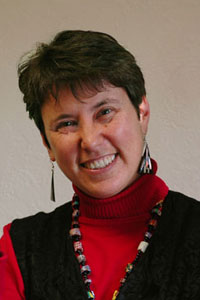by Liz Nichols
 Have you ever walked in to a nursing home, assisted living residence or adult day care center with a bag full of stories and a heart full of hesitation? Or dare I say dread? Or, do you love telling stories to older folks, but find yourself somewhat frantically trying to keep them awake and yourself feeling good about yourself?
Have you ever walked in to a nursing home, assisted living residence or adult day care center with a bag full of stories and a heart full of hesitation? Or dare I say dread? Or, do you love telling stories to older folks, but find yourself somewhat frantically trying to keep them awake and yourself feeling good about yourself?
I certainly have. Then in 2007 I had the chance to be trained in TimeSlips™, something I had read about in Storytelling Magazine a decade before. It’s a simple but profoundly transformative type of storytelling that is designed to engage people with memory loss – not as the audience, but as the tellers themselves.
If you’ve done or seen “Improvisational Storytelling” then you already get the idea.
What’s special about TimeSlips is that it was created by a pioneer in the field of “creative aging”, Dr. Anne Basting, who combines a background in experimental theater and in dementia care. Anne has all the qualities of a (s)hero – brains, daring, and most of all, heart. The result is a ritual framework that empowers people who may have lost the ability to hold a normal conversation to express their ideas and emotions and – like all of us – experience the joy of knowing their voice has been heard.
So you gather a group in a circle, ask them to give story ideas, and write down what they say. Read it back to them, and celebrate it. Simple, and surprisingly fun. But it doesn’t always come naturally.
Here are the key principles and practices of TimeSlips that I think can help us as storytellers work with people with memory loss, and other folks as well:
- Replace the pressure to remember with the encouragement to imagine.
Sometimes, inviting someone to “reminisce” can shut them down. A person who appears to have lost the ability to speak may just have lost the confidence, knowing they might say something “wrong,” or “crazy”. With the stress removed, personal memories and associations often do come out. - A picture is worth a thousand words.
TimeSlips always starts with a thought-provoking photo that is clearly NOT from anyone’s “real life”. There are no right answers to who, what, when, where, or why. “We’re just making it up together. You can say whatever you want.” Also, if someone was asleep or has forgotten what was said 5 minutes ago, they can’t remember the story, but they can still look at the picture and comment on it. - Turn over the keys to the creativity car.
As a storyteller I want to be in charge of the story, but the idea here is to validate whatever they say – to echo and record their ideas, even if it doesn’t always make sense to me. Someone who “can’t do” much can contribute one lovely word or gesture. The process is more important than the product. - They’re great at this, and we’re great at this!
They’re great because it is designed so that being in the moment and not worrying about the outcome works best. If we can get on board with that, we’re great because we can give their story back to them, celebrating it with voice, gesture, song, and style! - Reach out and touch someone.
How you begin and end makes all the difference. The circle becomes sacred as you take the time to be present and greet each person, and thank them at the end, holding the space for whatever happens in between.
The TimeSlips website has great photo prompts, and is designed to make it easy for anybody to try this approach, and to share the stories they create. If you’re interested in what it looks like in group settings with people with cognitive loss, listen to this radio piece about a group I led last year. And to delve even further, check out the online training.
November is National Alzheimer’s Awareness Month. Maybe it’s time to reach out.
About Liz
Liz Nichols got lost in the 398 (Folklore & Mythology) section of the public library at age ten and hasn’t found her way out yet. She tells stories for audiences of all ages, from the Asian Art Museum in San Francisco to the Greater Washington DC Folk Festival. Formerly the Storytelling Director of Oakland’s Stagebridge, the nation’s oldest senior theater company, she has taught storytelling to adults and children, trained museum docents, and brought out the creativity of people with memory loss. Liz is a Certified TimeSlips Trainer and Facilitator, and a certified Laughter Yoga Leader.
